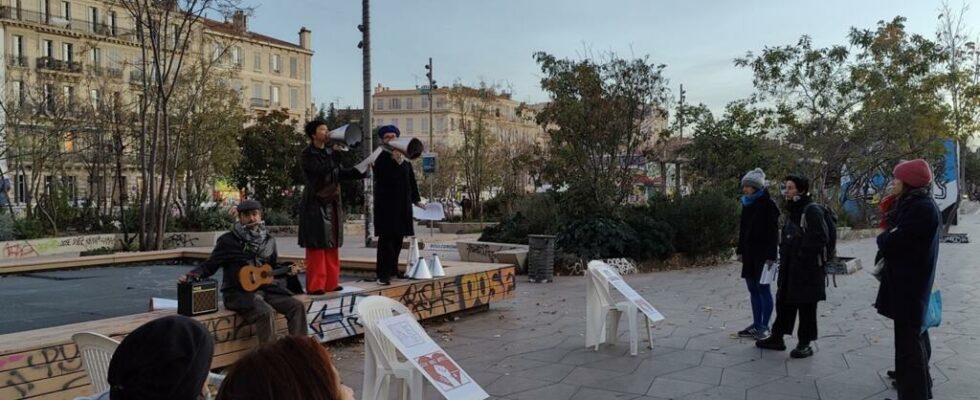Since November 7, 2024, the start of the trial of the collapses of the buildings on rue d’Aubagne in Marseille, which caused the death of eight people in 2018, civil society has been mobilizing to raise awareness about the challenges of so-called “unworthy” housing. “. Among their initiatives, street criers, responsible for informing passers-by about the latest events of the trial.
4 mins
With our correspondent in Marseille,
The trial in rue d’Aubagne began more than a month ago, but every week since the start of the public hearing, citizens have gathered in different parts of the city of Marseille to publicize it. Their tools? Makeshift megaphones lined with small wireless microphones, connected to a portable speaker. Their message? Report the main points of the trial, directly to the street.
Also readDrama on rue d’Aubagne in Marseille: six years later, the challenges of an extraordinary trial
This Friday, December 6, the street criers, (“Les crieureuses” as they call themselves), met at La Plaine, this large iconic square in Marseille, located not far from rue d’Aubagne. The auction will begin in a few moments, and Guillaume is busy making the final adjustments to his microphones. With a beret fixed on his head, the street crier describes their approach: “ For us, what is important is to tell them that there is a trial, and especially if there are people who do not have the time to read the press, to be able to listen to what is being said orally. The idea is just to stop people for a few moments, so that they can grasp a minute or fifteen of our text, that’s already it. »
Guillaume is a regular in the Noailles district, the same one on rue d’Aubagne, where he lived for a long time. With a fellow crier, Marien, they prepare the scripts for the summaries of the trial in rue d’Aubagne. Around twenty citizens take turns shouting the chronicles several times a week. To write their texts, they rely on popular clerks, present at the hearings, but also on the chronicles of the trial, with free access. on independent media Marsactu. “ We try not to leave too much room for interpretation. We are not here to replace justice, but to tell the story of what is happening there. », explains the street crier.
Anger and transmission
Harmonica in mouth, ukulele in hand, Guillaume accompanies the criers with jingles. That day, two of them shouted, including Christelle, 22 years old in Marseille: “ I was very upset by the collapses. I was in the demonstrations of anger, the demonstrations in tribute… we managed to fire Gaudin [maire historique de Marseille, fragilisé par les effondrements de la rue d’Aubagne en 2018, NDLR] (…) but afterward the unworthy habitat is still there, the trial reminds us of it and it is good that we remember it “. In fact, at least 40,000 homes are considered unworthy in Marseille, a figure that is undoubtedly below reality.
Chloe is also part of the group. This time she doesn’t shout, but listens to them, and she is also hired as a popular clerk at the trial. “ I lived in Marseille in 2018, and the collapses shocked me. I went to the trial and I saw the criers (…) it was a comfort that they were there (…) listening to the families of the victims of the collapses, who recount the lives of their loved ones, this It wasn’t easy, I didn’t expect to be so moved. Screaming allows you to be active… to let off some steam », explains Chloe.
Also readDrama of rue d’Aubagne in Marseille: citizens at the heart of the fight against substandard housing
Little by little, the semi-circle around the criers widens. Some stop on their way to do their shopping, others have their beer on the terrace while listening to them, accustomed to seeing them shouting once a week on the Plain. A resident, who arrived less than a year ago, praised the summary work, carried out in around fifteen minutes: “ It really allows us to feel that we are tackling the subject and that it is not just something that is managed judicially or administratively. »
After about fifteen minutes of legal chronicle, the criers read messages left in support of the victims’ families. The collective still has one week to inform the streets: they hope to hold a big final auction on December 18, the last day of the trial.
